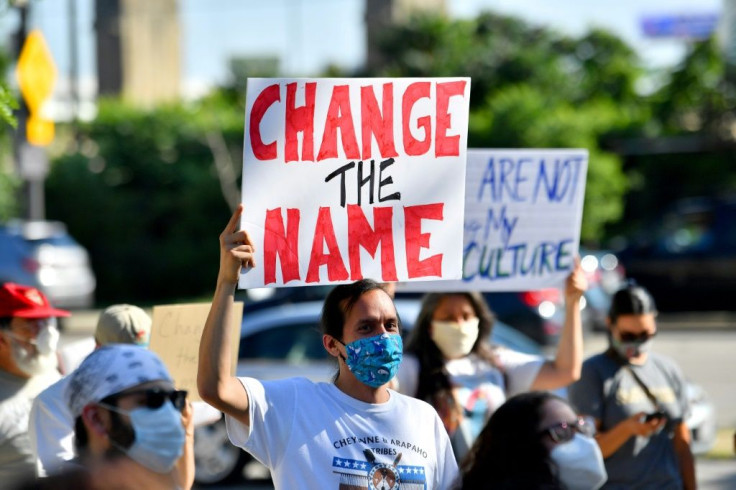Washington Football Team, Cleveland Indians Name Changes Could Mean Big Bucks
Washington and Cleveland took public relations wins when they finally agreed to give their Redskins and Indian ball clubs new names -- ones that weren't considered slurs to Native Americans.
And, if sports experts are right, the franchises are going to score another victory -- a financial windfall.
“There’s a ton of opportunity in change," Natalie Welch, a sports management professor at Linfield University, told International Business Times. "New merch, new apparel, new everything.”
Only a few years ago, Washington owner Daniel Snyder vowed to never change the team’s name. But he ultimately caved to pressure from corporate sponsors in July, upsetting some of the team's most loyal supporters.
Still, the experts predict even the diehards won't be holdouts. A 2012 study of fan spending on redesigned team logos showed the true blues ended up buying the most merchandise.
“They love their teams so much and they can’t stand hating the change,” sports economist Nola Agha told IBT.
“In order to get themselves to like the change, they try to invest in it by buying more things and using the name more often,” said Agha, who teaches sports management at the University of San Francisco and sits on the board of the North American Association of Sports Economists.
"And what it does is it allows them to start loving their team again.”
Changing a team name is not simple or cheap. Money has to be spent on new uniforms and apparel and marketing -- not to mention getting rid of the old logo on the stadium, team gym and practice field.
“The cost is definitely in the millions of dollars because you have the cost of actually doing the work and developing the new name and developing the new identity,” said Conor O’Flaherty, managing director at SME Branding, which handles pro and college sports brand development.
SME Branding has worked with several teams that changed names. For example, the company worked with the University of North Dakota five years ago when the school switched nicknames from the Fighting Sioux to the Fighting Hawks.
Rebranding takes roughly two years from start to finish, according to O’Flaherty. The change includes several phases so the team can stay true to what it represents.
“It’s a big undertaking. For fans in their mind for a franchise, the brand itself represents a part of who they are and what they stand for. It’s something they believe in. So, there’s a huge amount of benefits going through a process like this, but also there's drawbacks and challenges," he said
"You have to be very cognizant at the beginning of what you’re trying to achieve with this. What are you trying to deliver? Where do we want to go as a franchise?”
In July, the NHL’s newest expansion franchise settled on the Seattle Kraken. Before making a final decision, the organization trademarked 13 names.
Both Washington and Cleveland are being thorough in their name changes. Washington is temporarily Football Team. Cleveland will officially drop Indians for the 2022 season.
In 2008, MLB’s Tampa Bay franchise went from being called the Devil Rays to simply the Rays. Attendance jumped by more than 5,000 fans a game and very few fans pushed back on the new name. And a team that had never posted a winning record or reached the playoffs chalked up a franchise-record 97 games and wound up in the World Series.
“When the Tampa Rays changed from the Devil Rays, that wasn’t a huge deal," Welch said. "People weren’t up in arms and all crazy about that."
Still, despite the Rays' success, franchises shouldn't always jump at the opportunity for a name change. When the NFL’s Rams left St. Louis for Los Angeles in 2016, for instance, the franchise kept its name, which proved to be a smart move.
“People in St. Louis continued to be Rams fans because to them it was about the Rams first and foremost, and they didn’t care what city they were in,” Agha said. “So, we do see that the dynamic can go the other way. Sometimes keeping that name can actually be really important."
Considering the backlash to both the names Redskins and Indians, Washington and Cleveland have made the right call by deciding to rebrand themselves.
"There’s an opportunity to build identities which are positive and inclusive and represent two teams with two great traditions,” O’Flaherty said. “This is a long-term capital investment that’s going to pay dividends for decades to come.”

© Copyright IBTimes 2024. All rights reserved.






















